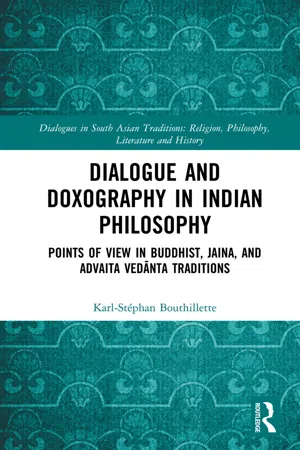
Dialogue and Doxography in Indian Philosophy
Points of View in Buddhist, Jaina, and Advaita Vedānta Traditions
- 210 pages
- English
- ePUB (mobile friendly)
- Available on iOS & Android
Dialogue and Doxography in Indian Philosophy
Points of View in Buddhist, Jaina, and Advaita Vedānta Traditions
About this book
This is the first book fully dedicated to Indian philosophical doxography. It examines the function such dialectical texts were intended to serve in the intellectual and religious life of their public. It looks at Indian doxography both as a witness of inter- and intra-sectarian dialogues and as a religious phenomenon. It argues that doxographies represent dialectical exercises, indicative of a peculiar religious attitude to plurality, and locate these 'exercises' within a known form of 'yoga' dedicated to the cultivation of 'knowledge' or 'gnosis' (jñ?na).
Concretely, the book presents a critical examination of three Sanskrit doxographies: the Madhyamakah?dayak?rik? of the Buddhist Bh?viveka, the ?a?dar?anasamuccaya of the Jain Haribhadra, and the Sarvasiddh?ntasa?graha attributed to the Advaitin ?a?kara, focusing on each of their respective presentation of the M?m??s? view.
It is the first time that the genre of doxography is considered beyond its literary format to ponder its performative dimension, as a spiritual exercise. Theoretically broad, the book reaches out to academics in religious studies, Indian philosophy, Indology, and classical studies.
Frequently asked questions
- Essential is ideal for learners and professionals who enjoy exploring a wide range of subjects. Access the Essential Library with 800,000+ trusted titles and best-sellers across business, personal growth, and the humanities. Includes unlimited reading time and Standard Read Aloud voice.
- Complete: Perfect for advanced learners and researchers needing full, unrestricted access. Unlock 1.4M+ books across hundreds of subjects, including academic and specialized titles. The Complete Plan also includes advanced features like Premium Read Aloud and Research Assistant.
Please note we cannot support devices running on iOS 13 and Android 7 or earlier. Learn more about using the app.
Information
Table of contents
- Cover
- Half Title
- Series Page
- Title Page
- Copyright Page
- Dedication Page
- Contents
- Acknowledgements
- Preface
- Introduction
- 1 The beginnings of Mādhyamika doxography: Bhāviveka’s MHK
- 2 The beginnings of Jaina doxography: Haribhadra’s ṢDS
- 3 The beginnings of Advaita doxography: Śaṅkara’s SSS
- Conclusion
- Bibliography
- Index